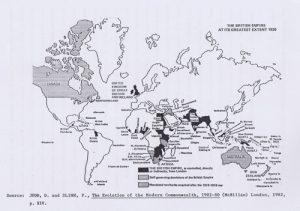From the British Empire to the Modern Commonwealth
Papua New Guinea, the largest of the Pacific territories, had been allowed to take a very leisurely course of political development. The reason for this was that “as late as the 1950s parts of the mountainous hinterland were still coming under with control for the first time; so Australian Administrators settled down to policies of slow and paternalistic development. The blood-bath of the Belgian Congo in the early 1960s seemed to reinforce this point, that a patient and cautious level of action should be pursued.”10 Therefore Australia tended to overlook the area and no withdrawal was planned before the next century. Nevertheless the elective principle was introduced in 1964. The international tide of nationalism suddenly swept over Papua New Guinea in the 1970s, causing the Australian government to reverse its policies. Independence was given in 1975, even before the local leaders asked for it.
The British territories of the Gilbert and Ellice Islands and the Solomon Islands Protectorate had very little regard for western political practice until the 1960s. “Traditional authorities functioned fairly much in their usual roles, although a political movement in one of the Solomon Islands, Marching Rule, had shown that there was some resentment towards outside rule, even as light as it was in the Solomons.”11 Nevertheless, in the 1960s, a small degree of western-style changes were introduced, along democratic lines, but traditional political patterns, it was hoped, would be kept too. In the New Hebrides introduction of a political solution was hampered by a comical type of government. In 1887, and later in 1906, a joint rule of British and French was imposed on the New Hebrides. This administration later developed into British, French and joint. As a result the islanders became angry, although elections were allowed at various levels of government; but it was not until the late 1970s when finally the French were prepared to hand over control to local hands.
In the case of small islands and bases which had helped to secure British influence around the world, the pressure on Britain began to mount and in any case, with a declining world role there was a declining need for such bases. Cyprus received independence in 1960. Malta was granted full nationhood in 1964. Aden and its hinterland also held strategic interest for Britain. Plans were made in the 1950s and 1960s to transfer political power to a federation of local communities. The British government was also trying to secure the friendship of rulers in the hinterland by bringing peace and offering other assistance. This approach did not have any result in the face of a powerful nationalist movement. Eventually, after some fighting and unsuccessful negotiations, independence was granted to the People’s Republic of Southern Yemen in 1967.
Some bases were not relinquished. Gibraltar wanted to stay a British colony and was not prepared to give in to the wishes of the Spanish government. The Falkland Islands were caught in a claim of ownership between Argentina and Britain. There were other small island dependencies where only limited political advance made any sense St. Helena, the Pitcairn Islands, and the vast Antarctic wastes. The Seychelles, however, with a population just over fifty thousand, obtained independence in 1976. As for Hong Kong, it was excluded from progress to independence by an external factor, and it continued to remain a crown colony. “Hong Kong, immensely wealthy and by for the largest remaining dependency, has its constitutional development frozen at a pre-representative stage by the sensitivity of its huge neighbour, China.”12 But, following the death of Chairman Mao, “the new Chinese leadership appeared to place particular value on Hong Kong’s role as a window on to the capitalist world.”13 This has brought Britain and China to agree in 1985, that the colony will be handed over to China when the “lease” of the New Territories expires in 1997. Some of the members of the Commonwealth also had dependent territories – in particular, Australia and New Zealand – but in all such cases the status of dependency was likely to continue.



